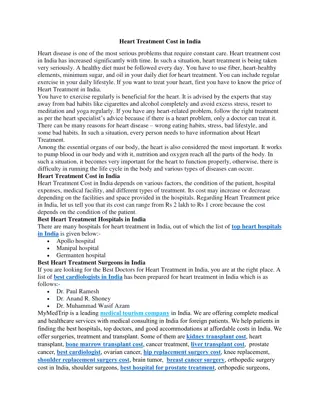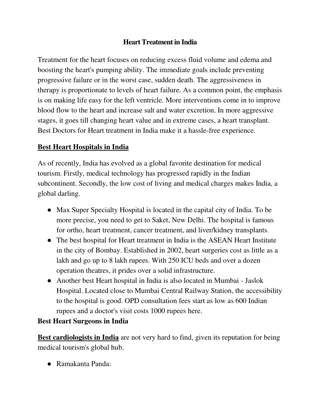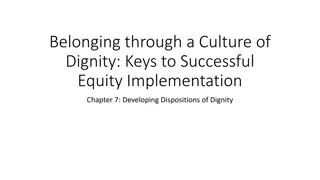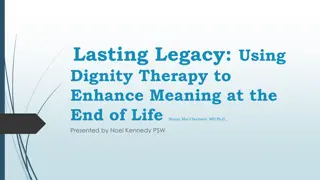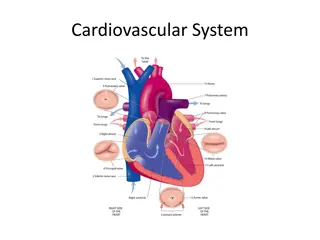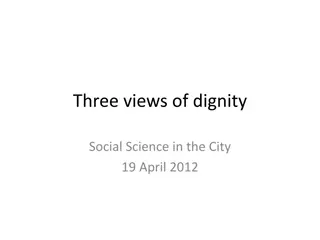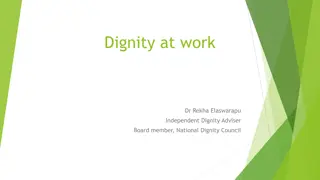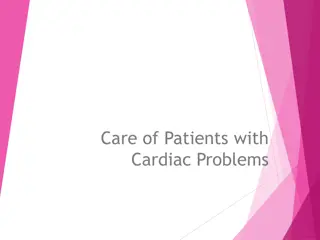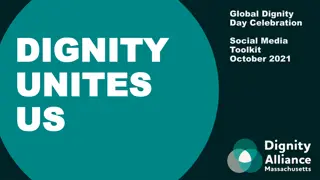Importance of Training in Delivering Quality Services with Dignity at the Heart
Training plays a crucial role in delivering quality services, especially when dignity is the key driver. This content highlights the significance of training, professionalism, and the impact of dignity in care services. It showcases the positive outcomes of prioritizing dignity, empowering residents, and fostering strong relationships in care settings. The narrative emphasizes the role of standards, attitudes, and compassion in achieving excellence in care provision.
Download Presentation

Please find below an Image/Link to download the presentation.
The content on the website is provided AS IS for your information and personal use only. It may not be sold, licensed, or shared on other websites without obtaining consent from the author.If you encounter any issues during the download, it is possible that the publisher has removed the file from their server.
You are allowed to download the files provided on this website for personal or commercial use, subject to the condition that they are used lawfully. All files are the property of their respective owners.
The content on the website is provided AS IS for your information and personal use only. It may not be sold, licensed, or shared on other websites without obtaining consent from the author.
E N D
Presentation Transcript
Welcome to the Gippsland Regional Advancing Clinical Education (GRACE) Program INSERT LOCATION AND DATE HERE
Facilitators INSERT YOUR NAME/S HERE Option insert information about facilitators eg role and experience. GRACE Program
Overview of the Group optional slide 16 Nursing 2 OT 5 Dental services 1 Dietetics 3 Radiography 1 PT 3 Psychology/Counselling Any Others? GRACE Program
CONFIDENTIALITY OF DISCUSSIONS During GRACE there will be many discussions about teaching, learning and working in clinical settings and participants may reveal very personal experiences. Please remember that what is said in the room stays in the room. You MUST NOT reveal the identity or affiliation of any of the speakers, however, you can of course use the information and understandings you gained from the discussion. GRACE Program
Experiential Education Tell me and I will forget. Show me and I may remember. Involve me and I will understand. Chinese Proverb, attributed to Confucius 450BC GRACE Program
Experiential Education Association for Experiential Education Carefully chosen experiences are supported by reflection, critical analysis and synthesis Learners are engaged intellectually, emotionally, socially, soulfully and/or physically The learner takes initiative, makes decisions and is accountable for results. The learner is actively engaged in posing questions, investigating, experimenting, being curious, solving problems, assuming responsibility, being creative, and constructing meaning GRACE Program
Experiential Education The educator's primary roles include setting suitable experiences, posing problems, setting boundaries and supporting learners The results of the learning are personal and form the basis for future experience and learning Relationships are developed and nurtured Outcomes of experience cannot be totally predicted. Learners and educators explore and examine their own values. GRACE Program




